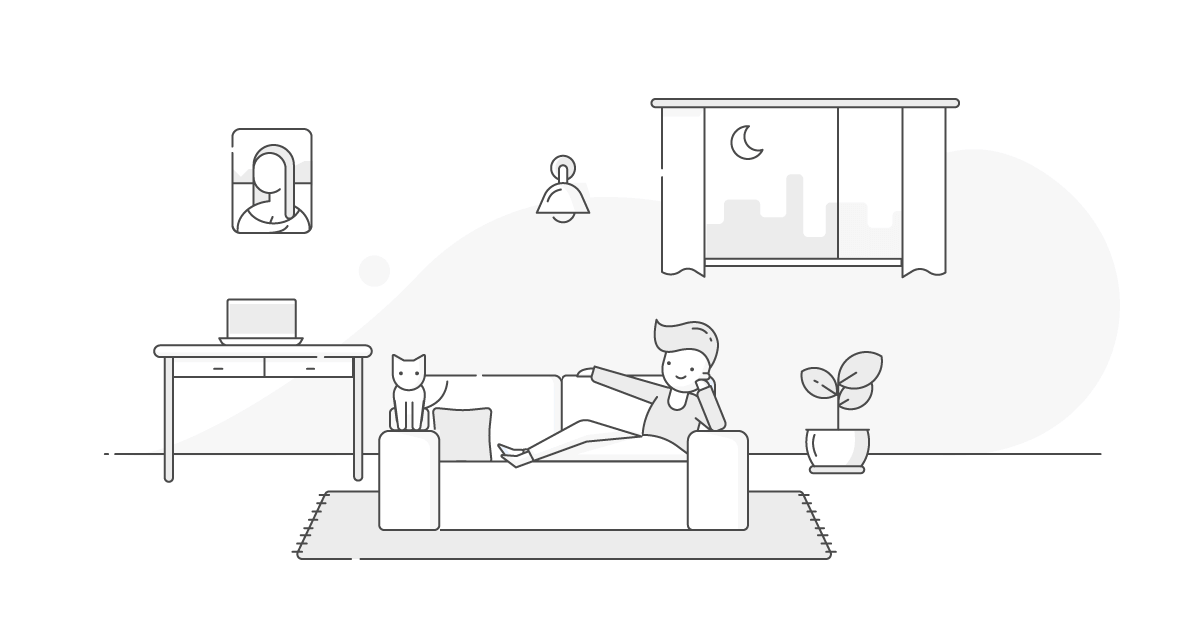- What are my rights as a tenant?
- 1. The right to live in a habitable residence
- 2. The right to get things fixed in a timely manner
- 3. The right to privacy
- 4. The right to live in a safe place
- 5. The right to get your security deposit back
- 6. The right to break your lease agreement
- 7. The right to sufficient notice before getting evicted
- What are my obligations as a tenant?
- What is my landlord forbidden from doing?
- Can my landlord evict me immediately?
- What should I do if my rights are being violated?
- Know your rights and obligations
Picture this: You come home after a long day, only to find your sink is leaking. When you ask your landlord to take care of it, you’re told it’s your responsibility. Ugh.
Most landlords would never do this – they’d take responsibility and fix the problem. But what happens if you have a difficult landlord who refuses to help out, even when they should?
Turns out, renters have several legal rights that help protect you from situations like this. But many of us aren’t completely sure what our rights as tenants are.
Wonder no more – here are some answers to the most burning questions about your rights as a rental tenant.
What are my rights as a tenant?
Every state is different (and we’re insurers, not lawyers), but here’s what legal rights of renters usually include:
1. The right to live in a habitable residence
Put simply, your landlord needs to make sure you’re living in reasonable conditions and provide you with certain necessities.
What kind of necessities? Things like clean drinking water, hot water, heating, working electricity, a functioning bathroom and toilet, and zero insect or rodent infestations.
Here’s a rule of thumb: If there’s a problem with the apartment itself (not the things you own within it) and you didn’t cause the issue, your landlord is most likely responsible for taking care of it.

2. The right to get things fixed in a timely manner
When something isn’t working properly, such as your plumbing or electricity, you have the right to ask your landlord to fix it.
So if your heat goes out in the dead of winter, you should get an answer within a few hours. But if the pressure in your kitchen sink faucet isn’t working up to par, your landlord might not need to reply as quickly.
What if your landlord ignores or rejects your request? Try writing your landlord a detailed, time-stamped letter explaining the issue, giving them a reasonable deadline to respond. After receiving the written complaint, they’ll have to promptly fix the problem. Here’s a thorough guide to writing a written complaint to your landlord.
Or, you can ask the Housing Authority to perform an inspection, and possibly demand your landlord to take action. But before you do so, make sure you aren’t breaching your lease by running a business in your apartment, having an animal in a no-pets residence, or committing other violations.
And keep in mind that if your pipes burst or a kitchen fire damages your stuff, your landlord won’t be responsible for paying the cost – that’s where your renters insurance comes in.
Btw, smaller fixes in your apartment might be up to you. As a general rule, you’re responsible for issues that arise from poor maintenance or general wear and tear, such as a small dent in the wall or scratch on the floor.
3. The right to privacy
Has your landlord ever walked into your apartment without permission?
Unless there’s a legitimate emergency, your landlord needs to let you know in advance when and why they’re visiting your home. In most states, they must let you know at least 24 hours before they come.
4. The right to live in a safe place
In most states, here are a few things your landlord must make sure you have:
- A smoke detector
- Drinking water
- Reasonable protection from theft
And here are some things your landlord needs to make sure you don’t have, in most states:
- Lead-based paint on your walls
- A leaking roof
- Rodent infestations
- Mold
Make sure to look up your local building and housing codes to see which safety rights you have.
5. The right to get your security deposit back
When you move out of your apartment, your landlord can’t keep the money from your security deposit without any explanation. In most states, landlords have around 30 days to return your deposit – and in certain rent-controlled properties, they must return the deposit with interest.
If your landlord withholds any money, they need to let you know why they’re keeping part of your deposit, including how much repair items cost.
And if you’re a pet parent, this also includes any pet deposit you paid, which can be returned when you move out of your place if your pet doesn’t cause any damage to the rental property.
6. The right to break your lease agreement
Technically, you’re allowed to break your lease whenever you want – but you might have to pay some penalty fees. These charges can range anywhere from one month’s rent to the remainder of your lease.
Like most things, how much you owe if you break your lease depends on what your contract says. Here are some steps to consider when thinking about breaking your lease:
1. Tell your landlord why you want to end your lease – they might fix the issue or find a new renter for you
2. Read your rental agreement, because you might be seriously fined if you break your lease. Typically, leases require you to give 1-2 month’s notice, and you might have to find a replacement renter
3. Contact a lawyer if you feel your landlord is being unfair or charging you too much
Btw, if your landlord failed to respond to maintenance requests or repeatedly violated your privacy, you might be able to waive any penalty fees that arise from breaking your lease agreement. And if you’re a victim of domestic violence or a current member of the U.S. military, you might have enhanced rights when it comes to breaking your lease.
7. The right to sufficient notice before getting evicted
If you don’t live in a rent-controlled building, you can be evicted for many reasons, including not having renters insurance if it’s required in your lease. But your landlord must give you advance notice (usually around 60 days) to leave the property, and tell you exactly why you’re being evicted (more on this later).
If you do live in a rent-controlled building, only certain things can legally lead to eviction, such as violating your lease, permitting illegal activity, not paying rent, or causing property damage. Rent control laws vary from city to city, so make sure to look up your local laws.
What are my obligations as a tenant?
Not only does your landlord have to abide by renters’ rights – you also have obligations to your landlord! Here’s a quick list of what you must do as a tenant:
- Abide by your lease agreement (including regulations around pets, move-out requirements, length of lease, etc)
- Pay your rent and other bills on time
- Maintain the unit you’re living in, including following building codes and keeping the unit safe and sanitary
- Respect your neighbors’ peace and quiet
- Refrain from using the property for an illegal purpose
- Prevent mold growth
- Allow your landlord to enter the unit (as long as they give you enough notice)
Take note that every state is different when it comes to your obligations as a tenant, so make sure to double-check your state’s regulations.

What is my landlord forbidden from doing?
By law, your landlord generally can’t discriminate against you based on race, color, religion, origin, sex, age, familial status, physical/mental disability and, in some places, your marital status or sexual orientation.
As a part of that, if you apply to rent and you have a disability, your landlord must make reasonable accommodations for you, such as installing ramps or leasing you a lower unit. But take note that major remodeling is generally not required.
In reality, discrimination is easier to feel than identify. So if you feel your landlord is giving you different conditions and requirements for your lease, contact the U.S. Department of Housing and Urban Development (HUD). They might recommend that you file a lawsuit, or mediate a negotiation between you and your landlord. Here’s how you can contact HUD.
Can my landlord evict me immediately?
In some states, your landlord can evict you immediately, but only in very specific instances, such as property damage, illegal activity, or repeated violation of your lease agreement.
In most states, immediate eviction is prohibited. It’s more common for your landlord to give you multiple days to fix the issue (aka, a correction period). During this time, you can pay the unpaid rent, fix damages to the property, or resolve any other issues that could have led to eviction.
If the problem isn’t resolved, your landlord may file an eviction, which gives you time to fight the claim in court. But if you accept the charge against you, you’ll usually have time (usually up to 30 days) to leave the residence with all your belongings.
In any case, look into the specific eviction laws in your state.
What should I do if my rights are being violated?
If your landlord is violating your rights, there are a few things you can do:
1. Formally communicate with your landlord about the issue. Keep a record of every conversation you have with your landlord about issues, just in case.
2. Refuse to pay rent. If your landlord ignores essential maintenance requests that render the unit unlivable or refuses to provide a safe environment, you may be able to withhold paying rent for the period of time you were living in an uninhabitable place, in some jurisdictions. But before doing so, you should talk with a lawyer.
3. Seek legal advice. If you still don’t see any results, you have the right to sue your landlord. Since hiring a lawyer can be expensive and hard, we suggest searching for someone local with experience in landlord-tenant matters.
Know your rights and obligations
Most landlords will respect your rights and requests, and you’ll find that they may even be willing to negotiate your rent with you, making for a much better relationship from the start. Unfortunately, not every landlord plays by the rulebook. Sometimes, they’ll overlook or disregard your rights, even without knowing it.
That’s why it’s important for you to know the rights you’re entitled to – if you don’t advocate for yourself, nobody will. Knowing your rights will help empower you to rise up with confidence and defend yourself when you need to most.




